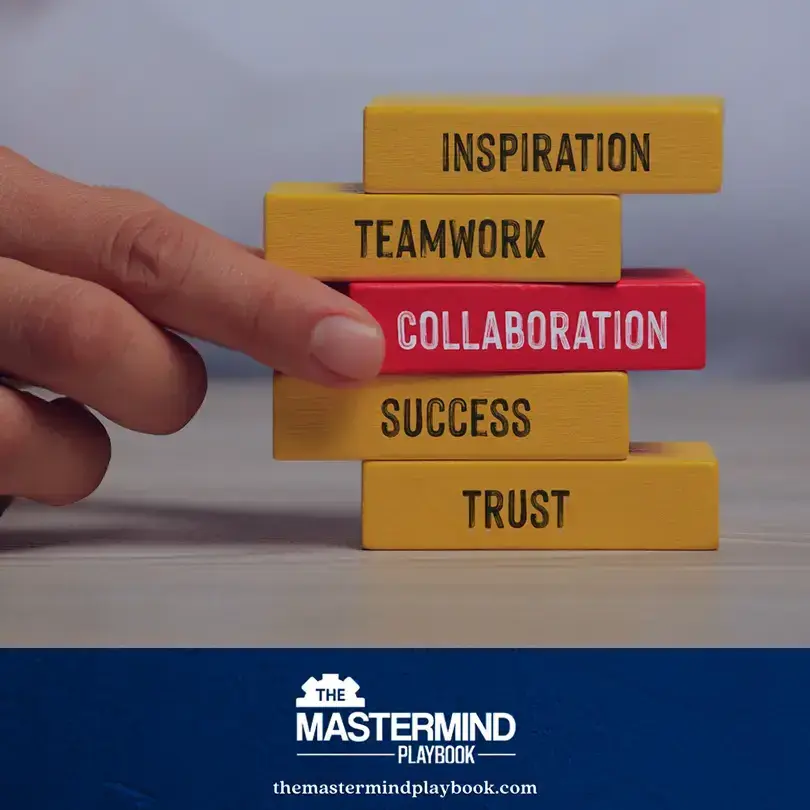3 min read
How Mastermind Facilitators Can Teach their Members to Become Effective Collaborators
Aaron Walker : Jul 20, 2021 12:00:00 AM

As Bill Harris gained more life experiences, he realized that the quality of his peer group and personal network and how it impacted his life for the better. This piece of wisdom motivated him to join the Iron Sharpens Iron (ISI) Mastermind Group.
As a decorated veteran, Bill decided that he wanted to start his own Mastermind Group catered towards veterans and first responders. Bill credits The Mastermind Playbook for giving him the practical knowledge and resources he needed to get his mastermind group off the ground, and continue growing it.
The key to Bill’s transition out of military service? He learned how to become an effective collaborator. He learned how to do so by joining a Mastermind, and he wanted to show other veterans how they could do the same thing through his new group. Bill’s story demonstrates the principles of effective collaboration:
Realizing the Importance of ‘Beginner's Mind’
To become an effective collaborator, begin by admitting you don’t have all the answers. Dan Sullivan speaks to this in Chapter 9 of Who Not How. In fact, Sullivan even suggests to consider yourself ignorant, in order to open yourself up to others’ points of view.
In Zen, the concept of ‘beginner’s mind’ refers to a practitioner's receptivity to new knowledge and perspectives. Zen philosophy demands emptying one’s mind of biases, preconceptions, and knowledge, so that it can be receptive to new perspectives.
Sullivan even gives the example of how Henry Ford became successful by explicitly seeking out and applying the wisdom of trusted mentors. Many people thought Ford was ignorant, including a group of Chicago lawyers who tried to prove the point by grilling him on a set of specific questions. However, Ford was made effective by his knowledgeable team, and he knew it. Ford was smart enough to recognize his own ignorance, and that’s what made him an effective leader.
As a Mastermind leader, you must encourage your members to adopt a beginner’s mindset by helping them to realize they don’t have all the answers. Many successful leaders struggle with a sense of arrogance which prevents them seeing their own shortcomings and blind spots. As a Mastermind leader, you must foster a sense of humility and curiosity... enabling you and your group to become effective collaborators.
Check out The Mastermind Playbook for more on the importance of humility and curiosity.
Apply the 80 Percent Rule
According to the 80% rule, we always find the first 80% of a task easier to accomplish than that last 20%. Dan Sullivan emphasizes the importance of minimizing feedback loops by getting the first 80 percent of a project done as soon as possible, and then promptly seeking feedback from others. This enables you to collaborate with others and keep your momentum.
Imagine, for example, that you are writing a book or essay. Completing a rough draft forms the brunt of the work, and you can often finish it quickly if you don’t fixate on every detail. However, completing the last 20 percent of the project, which might consist of editing, proofreading, and revising the book consumes more energy, although it only represents around 20 percent of the workload quantitatively. The analogy holds true for many different types of projects.
This is why Dan Sullivan says that you should not hesitate to hand work off work to the appropriate “who” in your network to receive feedback. When you hand off work promptly, you will minimize your feedback loop, meaning that you’ll be able to receive and implement feedback more quickly.
As a Mastermind leader, encourage your members to apply this principle as well. You should tell your members not to be shy, reluctant, or bashful when submitting work to collaborators for feedback. Doing so will enable your members to concentrate on the 80 percent of the work that they can do most effectively, and swiftly delegate the 20 percent of the workload that doesn’t match their skillset.
Check out The Mastermind Playbook for more information on the importance of receiving feedback.
Communicate Openly and Honestly
Finally, Sullivan teaches that you should bring an attitude of radical honesty to your communication with collaborators. Sullivan explains that no matter how competent you feel now, at some point in your life you will wind up feeling stuck or incapable. In these moments, you must be humble enough to honestly articulate your concerns to others. By doing so, you will open yourself up to receiving the input, guidance, and direction from the most important “whos” in your network.
This idea is encapsulated by Mr. Fred Rogers’s quote, which Sullivan mentioned in the chapter.
“Anything that’s human is mentionable, and anything that is mentionable can be more manageable. When we can talk about our feelings, they become less overwhelming, less upsetting, and less scary. The people we trust with that important talk can help us know that we are not alone.”
As a mastermind facilitator, you should empower your members to communicate their feelings openly and honestly to the group when they feel stuck.You should help your members to realize that embracing vulnerability reveals strength, not weakness.
How You Can Use the Connection Effect to Change the Lives of your Mastermind Group Members
If you ask an older adult about their greatest regrets, they’ll probably tell you they regret not spending more time with loved ones, and spending...
The Secret to Being the BEST Mastermind Leader: How to Improve Your Communication with the Art of Clear Expectations
The Secret to Being the BEST Mastermind Leader: How to Improve Your Communication with the Art of Clear Expectations

